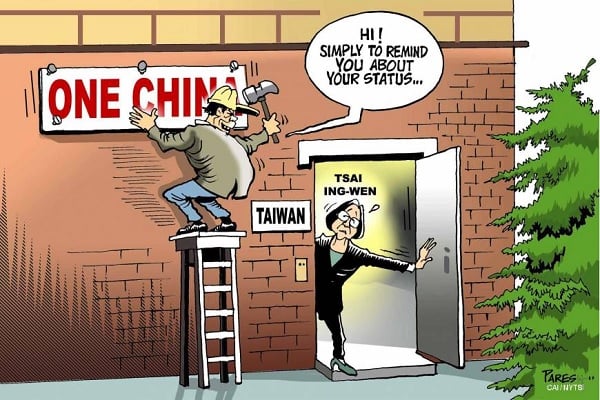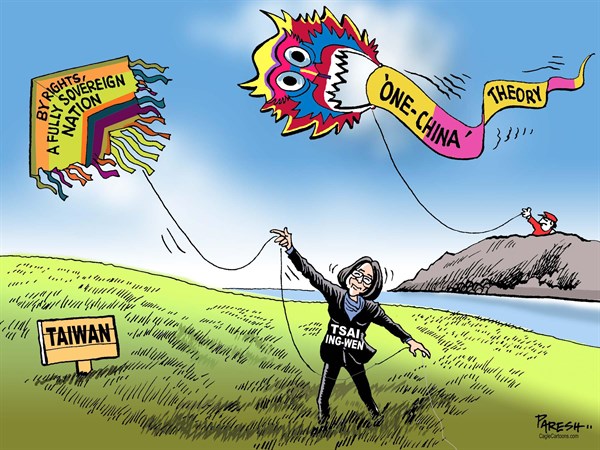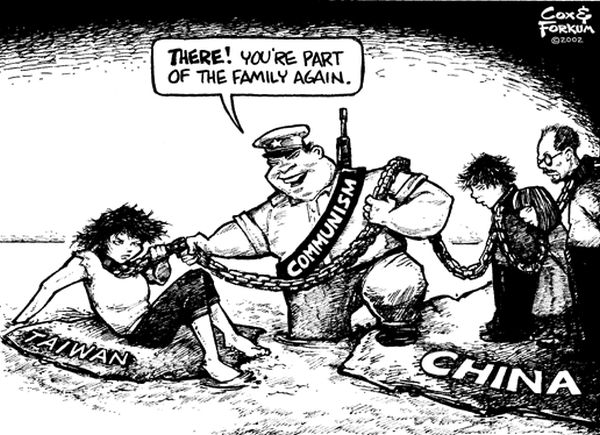
(Japan Times, 2016)
Much noise has been made about U.S. president-elect Donald J. Trump’s recent telephone conversation with Taiwanese president Tsai Ing-wen and about Trump’s challenge to the “one-China policy” that Beijing unilaterally considers “the cornerstone of Sino-U.S. relations.”
While state-run mainland Chinese media arrogantly declared that the “mainland must shape Taiwan’s future,” a cadre of professional China apologists in the United States attacked Trump for “provoking China,” and the current U.S. administration rushed to reassure Beijing that America still respected its precious “one-China policy.”
The one thing we mustn’t ever, ever do, according to much of the foreign policy establishment, is anything that might upset or offend mainland Chinese dictators. Above all, we must be sensitive to China’s easily-hurt feelings regarding its unilateral claim of sovereignty over Taiwan (aka the “one-China policy” to which all the world is expected to kowtow). However it may bully its neighbors and abuse the human rights of its own citizens, we must always keep China a happy panda.
More recently, China lodged “stern representations” against content in the U.S. National Defense Authorization Act for Fiscal Year 2017 including a plan to conduct high-level military exchanges with Taiwan. According to a December 26 editorial in People’s Daily, U.S. military cooperation with Taiwan “clearly violates the one-China principle, interferes in China’s internal affairs, infringes upon China’s sovereignty, endangers China’s national security, undermines peace and stability across the Taiwan Strait, and treats the Taiwan issue as a card to play against China.”

(Cagle Cartoons, 2016)
Let’s get real: Taiwan has never been a part of the People’s Republic of China. Taiwan is officially the one remaining part of the Republic of China that did not fall to communist rule in 1949. Previously, Taiwan was a colony of Japan from 1895 to 1945. Of the more than 120 years since Japan occupied Taiwan in 1895, the island has spent only four years (1945-1949) as part of a unified China.
While mainland China self-destructed under Mao, slaughtered its own young on Tiananmen Square, imprisoned dissidents, and constructed the world’s most extensive system of internet censorship, Taiwan underwent a normal course of development into the modern democracy and free society that it is today. Taiwan therefore has a very different history and a very different national identity from mainland China.
Nor do most of Taiwan’s 23 million citizens have any interest in being part of the People’s Republic of China. In every recent public opinion poll on the question, the vast majority of the island’s citizens are opposed to “reunification” with mainland China and consider themselves to be of “Taiwanese” rather than “Chinese” nationality. Tsai Ing-wen’s landslide electoral victory in early 2016 was furthermore a “clear call to remain separate from China.” Increasingly even the official name, “Republic of China,” is being rejected by independence-minded Taiwanese in favor of “Republic of Taiwan” to signify a complete break from China.
None of this matters to authoritarian Beijing, which insists that “Taiwan society ought to understand and attach importance to the feelings of the 1.37 billion residents of the mainland.” Funny how the opinions of the mainland’s 1.37 billion residents seem to matter to Beijing only when they can be turned against a smaller population that it wishes to subjugate. Like self-entitled brats, state-run mainland Chinese media have declared that “it’s Beijing who has the final say between peace and war on cross-Straits relations, not Taiwan or the U.S.”

(Sakura Jade House, 2016)
Mainland China is a one-party dictatorship, a human rights disaster area, and a clear adversary of the United States. Taiwan is a modern democracy with a positive record of respect for human rights and, at least potentially, a valuable U.S. ally in a region where the United States is losing allies almost by the day. While autocratic mainland China is rewarded for its bad behavior with full diplomatic recognition and full membership in the international community, however, democratic Taiwan is punished with diplomatic isolation.
For a nation such as the United States that considers itself a beacon of democracy and human rights, it doesn’t get much more ass-backwards than that. Beijing’s “one-China policy” is not merely a polite “diplomatic fiction“: It is an authoritarian absurdity, and continued U.S. obeisance to it is an insult to American values.